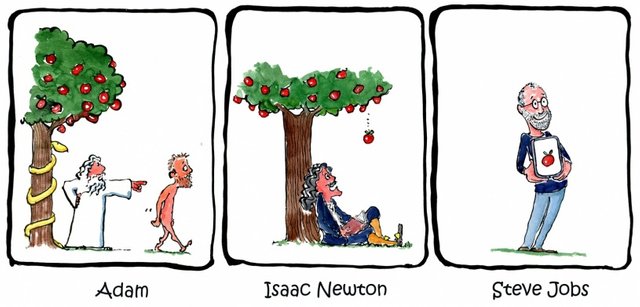Is Curiosity the "Forbidden Fruit" of Innovation?

Forbidden fruit: A thing that is desired all the more because it is not allowed.
The brain’s a funny thing…One of the funny things about owning a brain is that you don’t consciously decide which things it gathers and holds on to; which facts and stories it finds important. Things can stick in your mind FOR YEARS before you understand how you came to be interested in them and why they were so salient.
Here are a few of mine.
In the creation story, as told by the Bible, Eve chooses to eat the apple after being told that fruit from the Tree of Knowledge is forbidden.
Why did Eve choose to eat the apple?
And, what is this story really about?
No …I mean…really.
Many would suggest that the story is about curiosity; An “impulse” or “urge” that all humans have, but that we differ in how or what motivates us to act on them.
In Eve’s case, perhaps she ate the apple because she was told not to; the risk excited her, even if it meant something bad could happen.
Kind of like the rebel who when told:
Whatever you do, don’t press the red button

Smacks the button anyway...
But what if this interpretation is oversimplifying human impulses? What if curiosity is not just about an act of rebellion, albeit an important part of it?
Maybe there is more to the story …
Could it be that the understanding of “apple = not allowed" just didn’t fit with Eve’s knowledge of the world? That, counter to previously held beliefs, she believed knowledge had to be shared to have any real value?
Regardless of which story or fact you believe about our creation (a moot point), it would appear that the apple does, in principle, never fall far from the tree.
That, what starts out as an impulse or an urge (like in the story of Eve) can manifest into something more active, more searching: like a question.
Take for example the story of Isaac Newton:
Legend has it the young Isaac Newton was sitting under a tree when an apple fell on his head. While there is no evidence to suggest that an apple did, in fact, fall on his head, this observation did cause him to ponder why apples always fall straight to the ground.
Nothing like getting hit on the head to make you a world-class innovator! Can I get some of them apples?... Am I riiight?
But in all seriousness, Newton spent the best part of his life formulating and perfecting his theories for how this might be so.
Pondering BIG questions is where Newton liked to play.
And play he did.
After countless attempts and a persistent drive to “figure it out”, he discovered the law of universal gravitation;
Now we know why apples fall from the tree.
This story and countless others, prove that even the simplest of questions and ponderings can carry you out to the edge of human knowledge.
After all, isn’t this relentless pursuit of knowledge what made Steve Jobs’ so successful?
Steve Job’s curiosity for typefaces led him to attend a seemingly useless class on typography to develop his design sensibility. He didn’t have to get hit on the head, to know, that this sensibility would come in handy.
And he was right.
Later, this sensibility became an essential part of the way he designed computers and his companies’ core differentiator in the marketplace;
Which just so happens to be… You guessed it… An Apple.

Coincidence? I think not!
When we read stories of great innovators and ask questions like: What were they thinking when they ate that apple? Made that discovery? Spread that idea? We begin to realize that they are not so different from us.
I have no special talent. I am only passionately curious –
Albert Einstein
In reality, the human brain endows us all with a natural curiosity for how the world works.
And this inherent nature is as intrinsic to us as hunger or thirst. Like a child seeking to understand their world by asking a series of seemingly innocent questions like Why is the sky blue?
But.
And this is a Big BUT… (and I do not lie).
The sensation of curiosity can be experienced differently.
Meaning, to some (arguably to most), questions like why is the sky blue can seem daunting --- especially when you don’t know the answer.
Therefore, instead of feeding that child’s sense of wonder, searching for answers and "figuring it out" for ourselves, we pretend like we don’t care.
Or worse, we come up with a faulty hypothesis based on misinformation or offer clever remarks like: “because the sun reflects the Ocean” or “because the Smurfs decided to go sky-diving!”
So why is the sky blue, you ask? And what distinguishes a great innovator’s curiosity?
Here is an acceptable answer the next time someone asks:
Why is the sky blue?
Blue in sunlight collides with air molecules and our eyes see it as blue
For people like Isaac Newton and Steve Jobs, searching for answers to their impulses or urges is a joyous exploration!
They view challenges as an opportunity to grow and learn; they actively search for experiences that challenge how they think about themselves and the world and they actually enjoy learning about something unfamiliar.
Did the answer to why is the sky blue fascinate you too? If so, chances are you are well on your way to developing a mindset for innovation and adopting a whole new way of being and seeing in the world. Keep it up!
You see, before there were apple computers, we had to discover things using our eyes, our ears and our minds. Our human history is living proof that what starts out as an impulse or an urge can lead to some pretty profound discoveries and major contributions to the way we see, value and respond to the world.
So what do you say you push that red button already?
p.s. If you’re wondering where this red button came from? And why exactly does curiosity compel us to smack it down? Here’s some food for thought.
During the Cold War, the infamous red button never to be pushed was a metaphor: give into it and the nukes start flying. Of course, that button never actually existed.
In fact, this is a common misconception; Big red buttons are usually used to stop a perilous situation, not start one. The exact origin is hard to pin down but one thing is for sure, that red buttons started appearing alongside technology that could be considered dangerous and so needed an ABORT function that could be executed simply and quickly)
How do you like them apples? Leave a comment below!
push the buttom! no doubt! there should be no forbidden remaining in your thoughts and hopes... after all, fiction, imagination and ideas are the few differences between us and other human species!
Nice read. I leave an upvote for this article thumbsup
Thank you! I appreciate it!
Apple: "I'm full of 'bits' and 'bytes'"
Blackberry: "You're really pushing my buttons"
This post has received a 5.79% upvote from thanks to: @holovision!!!
thanks to: @holovision!!!
For more information, click here!!!!
If you use our Robot before your post has 1 day and get an Upvote greater than 1%, you will automatically receive Upvotes between 1% and 10% as a bonus from our other robots.
To the question in your title, my Magic 8-Ball says:
Hi! I'm a bot, and this answer was posted automatically. Check this post out for more information.
Congratulations @leadingmindslab! You have completed the following achievement on Steemit and have been rewarded with new badge(s) :
Click on the badge to view your Board of Honor.
If you no longer want to receive notifications, reply to this comment with the word
STOPVery excellent, friend.